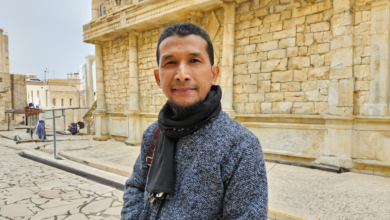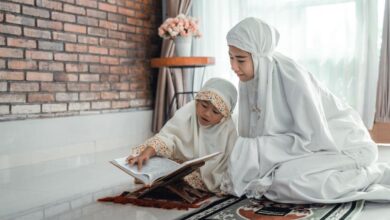
ا اجْعَلْنَا لِمَيْنِ لَكَ ذُرِّيَّتِنَا لِمَةً لَكَ ا اسِكَنَا لَيْنَا التَّوَّابُ الرَّحِيمُ
"O Lord, we make us those who submit to You and our children and grandchildren as well as people who submit to You and show us the ways of performing our pilgrimage, and accept our repentance, indeed You are Allah, the Accepter of repentance, the Most Merciful. Merciful." (Surat al-Baqarah verse 128)
This prayer can be used as an example to ask for pious and pious offspring and to make it easier to carry out the pilgrimage.
The story of Prophet Ibrahim is discussed in 9 surahs in Alquran (al-Baqarah, al-An'am, at-Taubah, Ibrahim, Maryam, al-Anbiya, Ash-Shura, Ash-Shaffaat, and az-Zukhruf). Surah Al-Anam verses 76 to 83 tells in detail how the father of these prophets sought his belief, namely that there is no god worthy of worship but Allah and preached his monotheism to his people.
"Ibrahim has succeeded in conveying the truth to his people by explaining that worshiping the stars is vanity, and by returning to human nature according to Allah's creation, namely to worship and unite Him," wrote Al-Muyassar's commentary.
After Prophet Ibrahim commented that the stars, moon and sun are not worthy of worship, Prophet Ibrahim began to introduce Allah SWT, namely the Lord worthy of worship. How Prophet Ibrahim introduced his Lord was enshrined in QS. Al-An'aam verse 79: "Indeed I confront myself with the Lord who created the heavens and the earth, with an inclination to the true religion, and I am not of those who associate partners with Allah."
Prophet Ibrahim told his people that "Those who believe and do not confuse their faith with injustice (shirk), they are the ones who have security and they are the ones who are guided."
It was for the effort to introduce monotheism to his people that Allah then glorified Prophet Ibrahim by giving proof or being good at solving a sign through argumentation. This is as enshrined in QS. Al-An'aam; 83: "And that is Our proof that We gave to Abraham against his people. We raise whom We will by several degrees. Verily, your Lord is Wise, All-Knowing."
Ibrahim Family Education
There are several signs Alquran on how to educate a pious generation. One of them is the educational model of Prophet Ibrahim AS who gave birth to pious descendants, especially Prophet Ismail AS.
If you examine a few verses Alquran and the history that tells the story of his life's struggles, the following educational model of Prophet Ibrahim in giving birth to pious children can be formulated:
First, Prioritizing a pious wife over beauty and wealth. History reveals, Prophet Ibrahim's first wife was Siti Sarah. After being married for some time and never having children, on Sarah's suggestion, Ibrahim married a black slave or maid named Siti Hajar.
Ibrahim is willing to marry Siti Hajar, a very simple woman, slave status, black, not beautiful and not rich. Hajar is a servant who believes, obeys, has a noble heart, and has a commendable character. Ibrahim is one of those people who puts forward his wife because of his faith and moral nobility even though he is only a slave.
Choosing a pious wife is a prerequisite for bearing a pious child. Because, the wife will be the first madrasa (al-ummu madrasa) for her children. Without the piety of a wife, it will be difficult to educate children to submit and obey Allah SWT.
Second, pray to be blessed with pious children. Even though Abraham was a prophet of Allah and His lover (khalilullah), but he still prayed to be blessed with a pious child. (Surat ash-Saffaat: 100).
لِى لصَّٰلِحِينَ
"O my Lord, bestow upon me (a child) who is among the pious."
This prayer teaches that educating children cannot be done with mere effort or pride ourselves as educated people, but it takes surrender of the soul to ask for His help. Moreover, educating children's faith or religious attitudes requires guidance from Allah SWT. So, ask Him while still trying to fulfill our obligations as servants.
Third, Be a role model for children and their families. The key to the success of Prophet Ibrahim's educational model is the exemplary method. In Alquran there are two verses that explain that Ibrahim is uswatun hasanah (Surah al-Mumtahanah: 4 and 6) for his people, including for his children.
In their psychological development, children tend to imitate (imitative) the people around them, especially from their parents. This is where the example of parents is needed, both in matters of faith, obedience to worship, attitudes, and daily behavior.
Ismail has the nature of halim, namely polite and patient (Surat ash-Shaffat: 101). In fact, Ismail has this trait because he imitates his father's character, who is also halim (Surah Hud: 75).
Fourth, choose a good environment for the mental development of children. After Hajar gave birth to Ishmael, Ibrahim took them to a deserted, barren place, called Makkah. Then, Ibrahim prayed that the place would be blessed and good for the mental development of his son (Surah Ibrahim: 37).
If the environment is good, it will be easy to shape the behavior of children, and vice versa. In a broader sense, parents must supervise the association of their children, choose schools that pay attention to the development of religious attitudes and noble character, including choosing a conducive living environment and supporting the development of children's mentality in a positive direction.
Fifth, democratic and communicative to children. The democratic and communicative attitude of Prophet Ibrahim can be seen from the story of the slaughter of his son. When Ibrahim received an order to slaughter his son, he called Ismail using the words "Ya bunayya" or "O my dear son". The word is a call full of affection, communicative between a father and son.
Ibrahim also asked Ismail's opinion about the order (Surah as-Shaffat [37]:102). An order that must be implemented, but still communicated democratically.
This implies that parents should educate their children in a democratic and communicative way. Parents may not impose their will on their children, except for matters of a principle nature, for example, regarding obedience to religious teachings. Parents should also not present themselves as a figure that children fear, but be a teacher who is loved, respected, and idolized.
Sixth, love children for Allah. As an ordinary human being, Ibrahim really loved his only son. However, Allah tested Abraham's love between Allah and Ishmael. For the sake of his love for Allah, Ibrahim was willing to sacrifice Ishmael.
This story teaches to love children solely for the sake of Allah. Because, if love for children exceeds love for Allah, disaster will be inflicted on the life of the family (Surah al-Taubah: 24). The most essential obligation of parents is to educate their children's faith, then save them from the torment of hell (Surat at-Tahrim: 6).
Seventh, involving children building the Baitullah, worshiping with children, and involving them in upholding the religion of Allah. Ibn Kathir in the book Qishash al-Anbiya 'explains, Ismail helped to collect stones and handed them to Ibrahim, then Ibrahim built the Kaaba building which was previously damaged. When building the Baitullah with his son, Ibrahim also prayed that they would become obedient servants and the land would be blessed (Surah al-Baqarah: 126-129).
Eighth, Prophet Ibrahim wanted and prepared his children to become leaders (imam) accompanied by prayer. However, Allah indicated that the descendants of Ibrahim who were made leaders were not unjust people (Surah al-Baqarah: 124).
In this way, Ibrahim educated his son to be a child who was fair, not unjust, either unjust in faith, namely shirk (Surah Luqman: 13) or unjust to himself for violating God's orders or carrying out God's prohibitions (Surah al-A'raf: 23 ). So, instead of building a political dynasty for the sake of power and personal interests, but to become a person who is responsible and benefits many people, as well as carrying out his function as the caliph of Allah fil-ardh.
As parents, we should be more worried about the future of our children's aqidah than just worrying about their careers and economic life (Surah al-Baqarah: 133).
Love Only for Allah
After Prophet Ibrahim AS married Siti Hajar, the second wife of Prophet Ibrahim gave birth to Ismail. According to Qatadah bin an-Nu'man—a friend of the Prophet Muhammad SAW—at that time Prophet Ibrahim AS was 85 years old.
During her journey, Siti Hajar often dared to oppose Siti Sarah's words. I was so irritated, one day Siti Sarah took a heavy oath, which was to cut Siti Hajar's flesh.
However, when Siti Sarah's anger subsided, she felt confused about her oath. Siti Sarah also told about her oath to her husband. Finally Prophet Ibrahim AS gave him a fatwa. Prophet Ibrahim AS said, "Hole both ears (Hajar)." The order was carried out. "This is the origin of the ear being perforated to put earrings," according to the opinion of some scholars.
The following days Siti Sarah said to Ibrahim, "I don't want to live with Hajar in one place."
Allah revealed to Prophet Ibrahim AS not to leave Sarah and ordered him to take Siti Hajar and Ismail to al-Haram (the land of Haram). At that time Ismail was still breastfeeding.
Prophet Ibrahim raised Ishmael and his mother on a camel. He took the water container and the bag filled with flour away to Mecca. Then Prophet Ibrahim AS placed them both in the Haram, which became the place of al-Bait as-Sharif (the noble house).
At that time, the land was a red hill. There, Prophet Ibrahim AS built a house out of a tree trunk. He left the two of them with a container of water and a bag filled with flour.
When Ibrahim was about to leave them both, Hajar said to him, "Where are you going?" Ibrahim replied, "To the area of Sham." Hajar said, "Why did you go and leave us in a place where there are no trees, no water, and no people?". Hajar kept asking Ibrahim several times, but Ibrahim did not turn to him. (Qur'an 14:37). Finally, Hajar said, "Did Allah tell you to do this?" Ibrahim replied, "Yes." Hajar said, “Then please go. He won't abandon us."
Ibrahim went away saying, "Our Lord, indeed I have placed some of my descendants in a valley where there is no vegetation near Your respected house (Baitullah); O our Lord, so that they may establish prayer. So make the hearts of some people inclined towards them and provide them with fruit, hopefully they will be grateful."
Ibrahim kholilullah. A lover whose love is tested and his lover's love is tested.
. ...
Ustadzah Erika Suryani Dewi, Lc., MA, during the Halaqoh study on Tuesday for Female Expatriates on June 29, 2021.
>>>This study was conducted online using the Zoom application and broadcast LIVE on the Facebook page Dompet Dhuafa Hong Kong. [DDHKNews]



